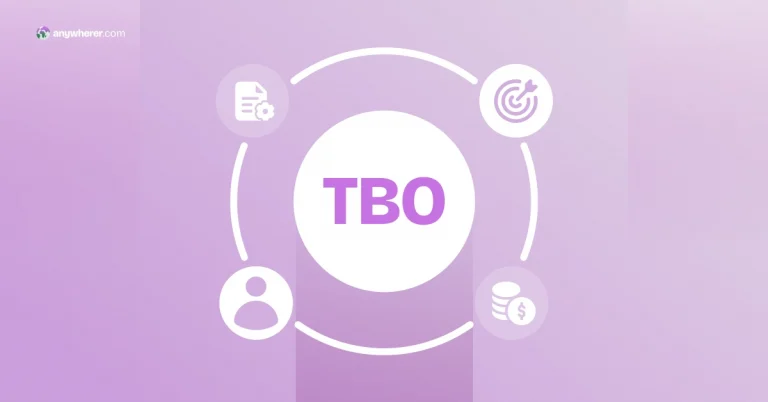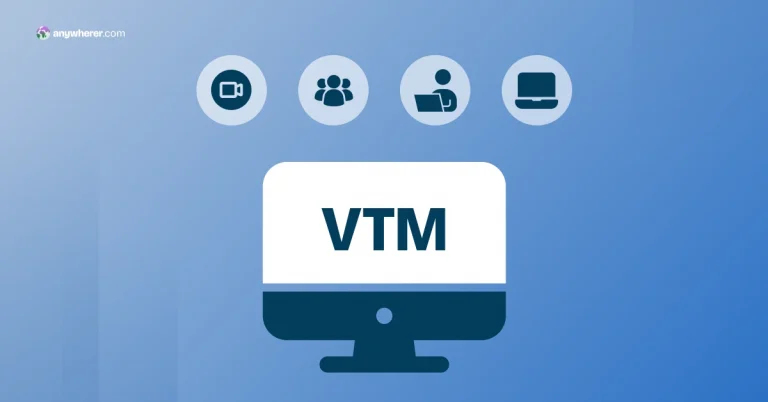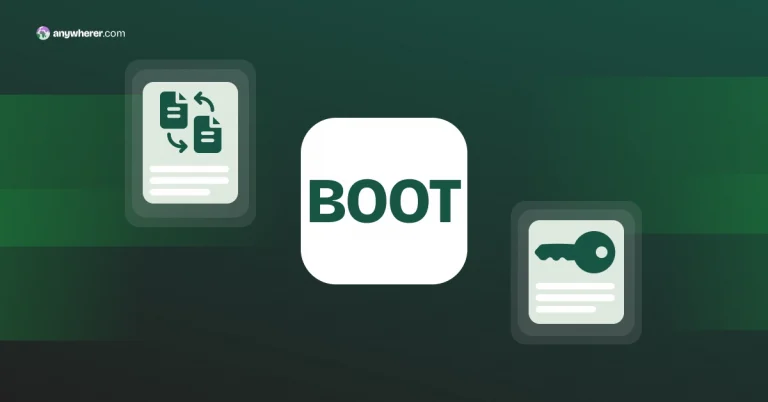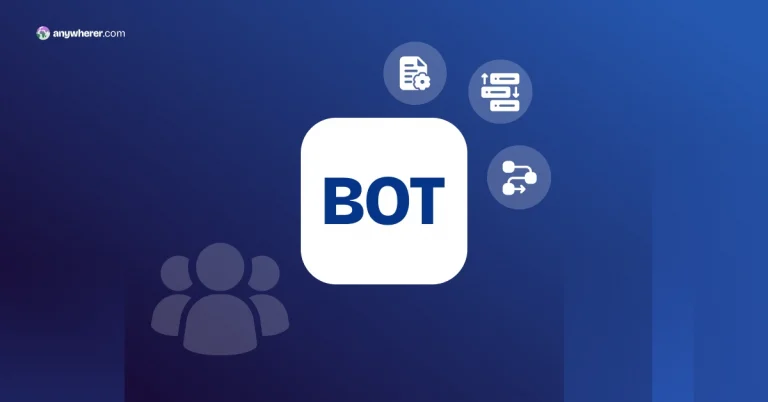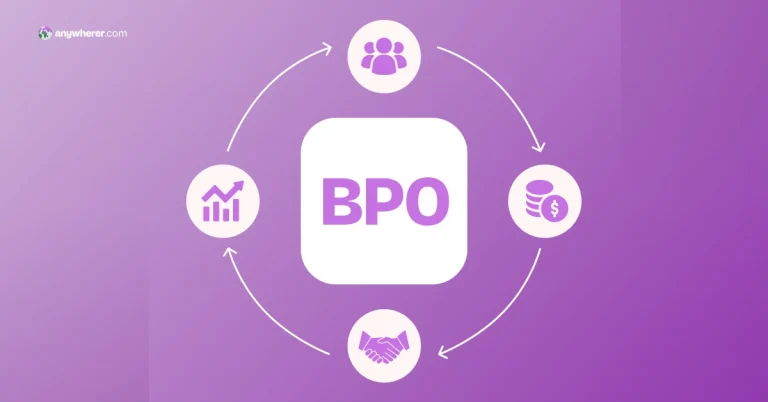Imagine your HR team spending 57% of their time on administrative tasks. This is a surefire way to lose focus on core business priorities. Over time, such pressure on the resources can leave your company stuck in a cycle of routine operations and paperwork instead of growing and improving efficiency. One way to cope with this burden is through HRO.
What does HRO stand for? It’s short for Human Resource Outsourcing. Like with other types of outsourcing, it means you can delegate tasks to someone besides your staff. According to the Global HRO Industry Report, the global market will grow from $44.3 billion in 2023 to $65.3 billion by 2030.
Read this article to find out more about what is HRO in detail: we will dive into Human Resource Outsourcing meaning, the types of tasks you can outsource, reasons for choosing an HRO, recommendations for finding a suitable vendor, and other aspects to help you form a well-informed decision.
What Is HRO?
Outsourcing HR tasks means you don’t need a full-fledged HR department or any for that matter. Before we move on to the definition of HRO, we should outline the factors that differentiate it from using in-house specialists, including its HRO meaning in terms of cost-efficiency, scalability, and access to expertise.
- Cost and efficiency. In-house HR teams require salaries, training, and HR software. In contrast, HRO offers a cost-effective solution by leveraging economies of scale, since you only pay for the volume of work.
- Expertise and compliance. Human Resource Outsourcing consultants are responsible for knowing labor laws and industry regulations, and any updates on them. This can come in handy if you intend to employ people in other regions or countries and your in-house team lacks this expertise.
- Scalability. HRO helps businesses adjust to their growth, while in-house teams may struggle with rapid expansion. If you need to hire more people, you will spend time recruiting and onboarding them, whereas with an HRO provider, you only need to negotiate the changes in workload.
- Technology and innovation. Many Human Resource Outsourcing vendors provide advanced HR software and automation tools that in-house teams may not have access to.
With this differentiation in mind, let’s define Human Resource Outsourcing.
HRO Meaning
The HRO acronym stands for Human Resource Outsourcing and means delegating HR functions to an external service provider instead of managing them in-house.
There are a few types of HRO. Which one you choose will depend on factors like the scope of tasks you want to outsource, the level of involvement you require, and anything else that stems from your business needs. The types of Human Resource Outsourcing include:
- Full outsourcing. You can have a vendor take over all related responsibilities, from recruitment and onboarding to managing payroll and compliance.
- Selective. If you only need to outsource some areas while controlling others, this option is for you. For example, you can delegate more complex or time-consuming tasks or ones that require specialized expertise.
- Learning and development. You can outsource the design, implementation, and management of training and development programs for employees. A dedicated specialist will develop a learning plan to help acquire new skills in leadership, compliance, etc.
- Employee Assistance Programs. If your employees require external support services for personal issues that may impact their work performance, you can outsource counseling, stress management, and legal or financial assistance.
Outsourcing Human Resource Functions: What Can Be Delegated?
The easy answer is everything that’s related to HR. But let’s define some of them along with reasons for outsourcing human resource functions and performance management assistance, and Human Resource Outsourcing examples.
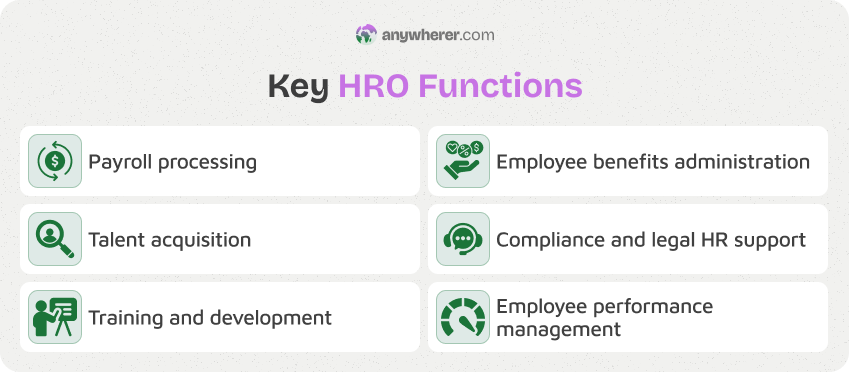
Payroll processing
An HRO team can calculate salaries, manage tax deductions, ensure compliance with labor laws, and handle direct deposits. The job may also include overtime calculations, bonuses, and payroll reporting.
Reasons to outsource:
- So payroll errors or tax miscalculations don’t lead to compliance risks.
- To expand your business to new locations.
- To save time and money on in-house payroll management.
Example: A growing tech startup with employees across multiple states outsources payroll to ensure tax compliance and timely salary payments without the burden of managing it internally.
Employee benefits administration
This HRO process includes managing employee health insurance, retirement plans, paid leave, wellness programs, and other benefits contributing to job satisfaction and retention.
Reasons to outsource:
- If you don’t have the necessary expertise to negotiate cost-effective benefits packages.
- To handle benefits enrollment and provide employees with access to better benefits.
Example: A mid-sized company wants to offer competitive health insurance but lacks the resources to negotiate plans. Outsourcing benefits administration helps them secure better options for employees.
Talent acquisition
You can hire an HRO vendor to help source, screen, interview, and hire new employees. The external team will also handle background checks, skills assessments, and onboarding processes.
Reasons to outsource:
- You need help with large-scale hiring.
- You want to access specialized talent quickly.
- Streamline the hiring process.
Example: A manufacturing firm expanding its operations needs to hire 100 employees quickly. Outsourcing recruitment helps them find qualified candidates faster.
Compliance and legal HR support
Human resource consulting outsourcing vendors can help ensure your company adheres to labor laws, workplace safety regulations, anti-discrimination policies, and employee rights. They provide audits, documentation, and legal advisory services.
Reasons to outsource:
- You operate in multiple locations with varying labor laws.
- You don’t want to risk wrongful termination, discrimination claims, or wage disputes.
Example: A retail chain with stores in different states outsources HR compliance to avoid penalties related to labor law violations.
Training and development
This HRO outsourcing function covers employee training programs, leadership development, and skill enhancement to improve workforce performance and career growth.
Reasons to outsource:
- You don’t have an in-house specialist to develop a training program.
- Your employees require industry-specific skills and certifications.
- A new department that requires specialized training.
Example: A financial services firm outsources cybersecurity training to ensure employees comply with data protection regulations and industry best practices.
Employee performance management
It involves setting performance goals, conducting evaluations, gathering employee feedback, and implementing improvement plans.
Reasons to outsource:
- Your HR team struggles to conduct unbiased performance reviews.
- You want to establish a structured, data-driven approach to performance tracking.
- You want external experts to help with leadership development.
Example: A multinational corporation implements an outsourced AI-driven performance management system to track and improve employee productivity across global teams.
The Advantages of Human Resource Outsourcing and Its Challenges
Human Resource Outsourcing takes the heavy lifting of HR off your plate, giving you more time to focus on, well, everything else. But like any partnership, it’s not all smooth sailing – you might hit a few bumps along the way.
Before we get into the potential challenges, let’s talk about the key Human Resource Outsourcing benefits and why it’s worth considering in the first place.
Key HRO Benefits and Challenges
Benefits
- Reduces expenses related to HR staff, training, and technology.
- Ensures compliance with labor laws and best HR practices.
- Streamlines HR operations and adapts to business growth.
- Provides better payroll, benefits, and HR support.
Challenges
- Outsourcing reduces direct oversight of HR operations.
- Potential vulnerabilities in handling sensitive employee data.
- External HR teams may not fully align with company values.
- Unexpected fees for additional services or customizations.
Why HRO is a win for your business:
- Cost savings. Forget about overhead costs of an in-house HR team. No more spending on salaries, training, or expensive HR software.
- Access to HR expertise. HRO consulting is like a walking encyclopedia of labor laws, employee relations, and best practices – so you don’t have to be.
- Compliance without the headache. Employment laws change constantly, and keeping up with them is practically a full-time job. Mess it up, and you could be looking at fines or lawsuits. HRO providers make sure you stay on the right side of the law.
- Increased efficiency. Offload the repetitive HR tasks (payroll, benefits, admin work), so your internal team can focus on big-picture strategies instead.
- Better employee experience. Faster payroll processing, better benefits, and smoother conflict resolution. Your employees may even thank you.
But Human Resource Outsourcing solutions have their challenges. HRO isn’t a magic fix for everything. If you’re not careful, you might run into a few issues. The good news? Every challenge has a solution.
HRO Challenges & Their Solutions
Challenge
Explanation
Solution
Less control over HR
You’re handing over key HR functions to an external provider, which means less direct oversight.
Set clear Service-Level Agreements (SLAs) and maintain regular check-ins with the HRO provider.
Data security risks
HR deals with sensitive employee info, and if the provider’s security isn’t airtight, your data could be vulnerable.
Choose an HRO provider with ironclad cybersecurity, including encryption and GDPR compliance.
Cultural mismatch
If your outsourced HR team doesn’t understand your company’s vibe, they could make decisions that don’t align with your culture.
Work with an HRO that customizes services to fit company values and integrates well with internal teams.
Unexpected costs
Some providers nickel-and-dime you with extra charges for compliance support, employee training, or custom reports.
Read the fine print, demand pricing transparency, and negotiate a Human Resource Outsourcing agreement that actually fits your needs.
Less personal interaction
Employees might feel disconnected if HR support is mostly remote or automated.
Pick an HRO provider that offers dedicated HR reps and responsive support.
HRO can seriously improve your HR operations – as long as you choose the right provider and go in with a plan. By keeping an eye on potential pitfalls and making sure your HRO partner is a good fit, you’ll get all the benefits without the headaches.
Cases When HRO Is a Perfect Fit
- You experience rapid growth and need scalable HR solutions.
- You want to expand into new markets with complex labor laws.
- You have limited internal HR resources or expertise.
- You’re seeking cost-effective alternatives to in-house HR management.
- You’re facing compliance challenges in multiple locations.
- You’re looking to enhance employee experience through better HR services.
How to Choose the Right HRO Provider
Finding the right HRO provider isn’t just about outsourcing HR tasks—it’s about finding a partner that gets your company, keeps things running smoothly, and actually makes your life easier. The best provider should handle the nitty-gritty HR stuff while aligning with your company’s vibe, growth plans, and long-term goals. So, how do you find “the one”?
1. Figure out what you actually need
Before you start scrolling through endless HRO outsourcing options, ask yourself: What HR headaches do you want to get rid of?
Struggling with compliance? Go for a provider that knows labor laws like the back of their hand. Hiring a nightmare? Pick one that’s a pro at talent acquisition. Need an all-in-one solution? Look for a provider that can handle payroll, benefits, and performance management. Basically, know what’s stressing you out before you start swiping right on providers.
2. Find someone who knows our industry
Not all HR challenges are the same. For example, a healthcare company has different needs than a tech startup or a manufacturing business.
If you’re in healthcare, your provider better know HIPAA inside and out. In finance? They should be sharp on compliance and risk management. Manufacturing? Make sure they understand union regulations and workforce scheduling. The more they get your industry, the fewer headaches you’ll have later.
3. Check their tech
You want modern, user-friendly HR software that makes payroll, performance tracking, and employee self-service easy. Bonus points if they use cloud-based platforms, so you’re not dealing with endless downloads, and have solid cybersecurity.
4. Check their compliance and legal expertise
Labor laws change frequently. Ensure the provider stays updated on state, national, and international HR regulations to prevent legal risks.
5. Analyze their service flexibility and scalability
Your business may grow or change over time, so the HRO provider should be able to scale services accordingly. Especially if your business deals with seasonal changes in the workforce.
6. Review pricing and contract transparency
Ensure there are no hidden costs and that pricing is flexible based on the services required. Ask whether the pricing structure is per employee or service-based, if there are any extra charges for additional HR functions, and whether the provider offers customized service plans.
7. Assess customer support and communication
A reliable HRO provider should offer dedicated account managers and responsive support for HR-related concerns. A surefire way to understand if a provider has proficient support is reading user reviews, as this is what people usually note about their experience.
8. Ask for client references
Check customer reviews, testimonials, and case studies to assess the provider’s reliability and reputation. You can find such evaluations on review websites (G2, Capterra, Trustpilot, etc.) and in case studies on the provider’s website.
9. Request a demo or trial
Before committing, ask for a demo of HR software or a trial period to evaluate the provider’s efficiency and see how smoothly their services work.
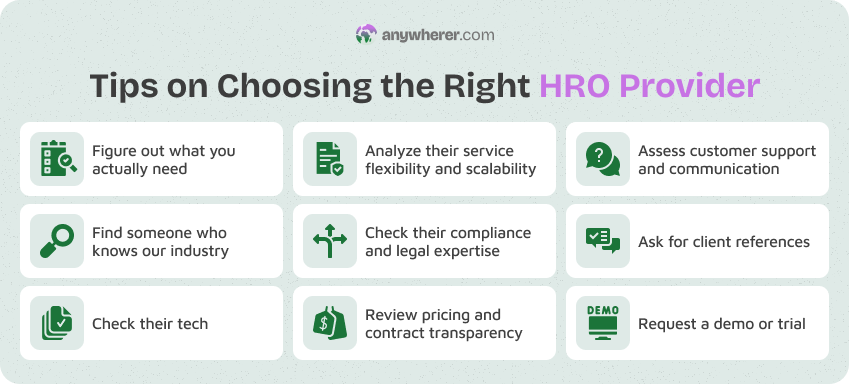
HRO isn’t just about offloading HR tasks anymore – it’s evolving fast as companies push to be more efficient, flexible, and competitive. Let’s see what Human Resource Outsourcing trends are shaping the future market
What Are the Trends in Human Resource HR Outsourcing?
Digital transformation is taking over
HR is going high-tech. Companies are embracing AI, automation, and data-driven HR software to streamline recruitment, payroll, benefits, and overall employee management. The goal? Less paperwork, faster processes, and smarter decision-making.
Happy employees = better business
Companies are realizing that better onboarding, professional development, and benefits lead to higher retention and engagement. HRO providers can offer access to perks and training programs that smaller businesses might not be able to afford on their own.
The workforce is going global
Borders don’t mean much in today’s job market. More companies are hiring international talent and expanding into new regions. For example, businesses may opt for the BOOT model or a PEO for global recruitment and human resource management outsourcing. Such providers can handle the legal and HR complexities of international teams.
If you’re interested in learning more about such models, we have several definition articles on our blog, including one about PEO cost.
HRO Provider Selection Checklist
Before choosing an HRO provider, companies should answer the following questions to ensure they select the best fit for their needs.
- Business needs & goals – What HR tasks do we need to outsource? How does this fit our long-term strategy?
- Industry expertise – Do they have experience in our sector? Can they handle industry-specific compliance?
- Service flexibility – Can they customize solutions? Is their service scalable? Do they support global teams?
- Compliance & risk – How do they stay updated on labor laws? Do they offer compliance audits?
- Technology & security – What HR software do they use? Is it user-friendly and secure?
- Pricing & contracts – Is pricing transparent? Are there hidden fees? Can we tailor the package to our budget?
- Customer support – Do we get a dedicated account manager? How fast is their response time? Do they offer 24/7 support?
- Reputation & reviews – What do clients say? Can they provide references?
- Trial & onboarding – Do they offer a demo? How long is onboarding? What training is included?
Who Benefits from HRO?
Outsourcing human resource functions isn’t just for massive corporations or companies drowning in paperwork. A ton of industries can gain from handing off HR tasks—whether it’s about saving time, cutting costs, staying compliant, or just making life easier. Here are a few that stand to benefit the most:
- Tech: Growing fast? HRO has your back
An HRO provider can take care of your payroll, compliance, and benefits, so tech companies can focus on, you know, innovating. Bonus: They can also help with tricky data privacy laws.
- Healthcare: Keeping it compliant
An HRO provider makes sure med personnel credentials stay up to date while also handling payroll, benefits, and the never-ending list of compliance rules. Because let’s face it—healthcare workers have enough on their plates already.
- Manufacturing: Navigating payroll, unions, and seasonal hiring
HRO services can help you navigate the fluctuating workforce needs, union contracts, and a mountain of labor laws, manufacturing HR is no joke. That way, companies can focus on production—not paperwork.
- Financial Services: Finding and keeping top talent
HRO providers can take the pressure off by streamlining recruitment, handling benefits, and making sure employees are supported – so firms can focus on growing their portfolios instead of drowning in HR admin.
The bottom line? If your industry involves rapid growth, heavy compliance, complex hiring, or a ton of administrative work, HRO is probably worth considering.
Key Takeaways About Human Resource Process Outsourcing
What does HRO mean? It’s a way for companies to offload HR tasks to an external provider, freeing up time, cutting costs, and keeping things running smoothly. Instead of juggling payroll, benefits, compliance, and employee management in-house, businesses can bring in experts who handle it all so they can focus on big-picture goals instead of drowning in admin work.
But here’s the thing: not all HRO providers are created equal. Choosing the right one means looking at what your business needs, how flexible their services are, whether they’re rock-solid on compliance, and – of course making sure no hidden costs are lurking in the fine print.
FAQ About the Human Resource Outsourcing Process
What is HRO and how does it differ from in-house HR management?
HRO is when a company outsources HR tasks to an external provider, while in-house HR keeps everything within the company. According to the HRO definition, the key difference lies in the level of control you have over each team.
What are the cost benefits of outsourcing HR?
HRO can cut costs because you need fewer internal HR staff. It minimizes compliance risks since you have less chance of pricey legal issues. You can also save money from improving efficiency with HR automation and tech-driven solutions.
How does HRO differ from a Professional Employer Organization (PEO)?
HRO let’s you keep full legal control of your employees while outsourcing HR tasks. PEO acts as a co-employer, meaning they share legal responsibility and handle payroll, taxes, and benefits under their own tax ID.
Can a company partially outsource HR instead of full outsourcing?
Absolutely! Companies can outsource specific HR functions while keeping strategic HR roles in-house. It’s a mix-and-match approach that works for many businesses.
How does HRO impact employee experience and company culture?
HRO can enhance employee experience with faster, more efficient payroll, access to better benefits and perks, 24/7 support. That said, if not handled well, it could make employees feel disconnected—so choose an HRO provider that aligns with your company culture.
How do HRO providers handle payroll and benefits administration?
HRO providers take care of payroll processing, tax compliance, benefits enrollment, claims management, and regulatory reporting using specialized HR technology and compliance expertise to ensure accuracy and efficiency.
Ready to streamline HR? Explore how HRO can save you time and stress or dive into more global workforce solutions with Anywherer!

Yaryna is our lead writer with over 8 years of experience in crafting clear, compelling, and insightful content. Specializing in global employment and EOR solutions, she simplifies complex concepts to help businesses expand their remote teams with confidence. With a strong background working alongside diverse product and software teams, Yaryna brings a tech-savvy perspective to her writing, delivering both in-depth analysis and valuable insights.

